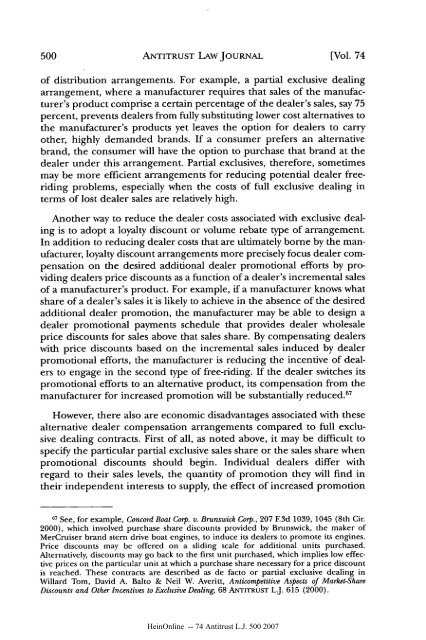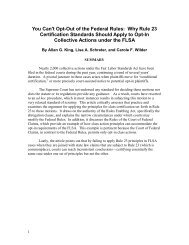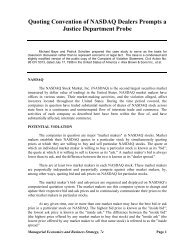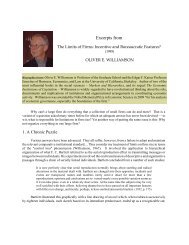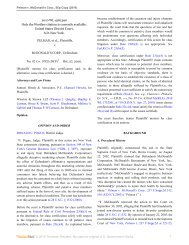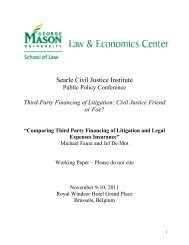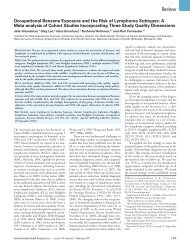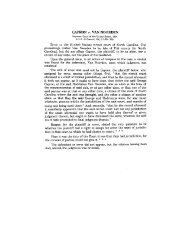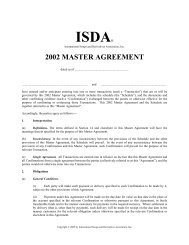Klein and Lerner, âThe Expanded Economics of Free-Riding: How ...
Klein and Lerner, âThe Expanded Economics of Free-Riding: How ...
Klein and Lerner, âThe Expanded Economics of Free-Riding: How ...
You also want an ePaper? Increase the reach of your titles
YUMPU automatically turns print PDFs into web optimized ePapers that Google loves.
ANTITRUST LAW JOURNAL[Vol. 74<strong>of</strong> distribution arrangements. For example, a partial exclusive dealingarrangement, where a manufacturer requires that sales <strong>of</strong> the manufacturer'sproduct comprise a certain percentage <strong>of</strong> the dealer's sales, say 75percent, prevents dealers from fully substituting lower cost alternatives tothe manufacturer's products yet leaves the option for dealers to carryother, highly dem<strong>and</strong>ed br<strong>and</strong>s. If a consumer prefers an alternativebr<strong>and</strong>, the consumer will have the option to purchase that br<strong>and</strong> at thedealer under this arrangement. Partial exclusives, therefore, sometimesmay be more efficient arrangements for reducing potential dealer freeridingproblems, especially when the costs <strong>of</strong> full exclusive dealing interms <strong>of</strong> lost dealer sales are relatively high.Another way to reduce the dealer costs associated with exclusive dealingis to adopt a loyalty discount or volume rebate type <strong>of</strong> arrangement.In addition to reducing dealer costs that are ultimately borne by the manufacturer,loyalty discount arrangements more precisely focus dealer compensationon the desired additional dealer promotional efforts by providingdealers price discounts as a function <strong>of</strong> a dealer's incremental sales<strong>of</strong> a manufacturer's product. For example, if a manufacturer knows whatshare <strong>of</strong> a dealer's sales it is likely to achieve in the absence <strong>of</strong> the desiredadditional dealer promotion, the manufacturer may be able to design adealer promotional payments schedule that provides dealer wholesaleprice discounts for sales above that sales share. By compensating dealerswith price discounts based on the incremental sales induced by dealerpromotional efforts, the manufacturer is reducing the incentive <strong>of</strong> dealersto engage in the second type <strong>of</strong> free-riding. If the dealer switches itspromotional efforts to an alternative product, its compensation from themanufacturer for increased promotion will be substantially reduced. 67<strong>How</strong>ever, there also are economic disadvantages associated with thesealternative dealer compensation arrangements compared to full exclusivedealing contracts. First <strong>of</strong> all, as noted above, it may be difficult tospecify the particular partial exclusive sales share or the sales share whenpromotional discounts should begin. Individual dealers differ withregard to their sales levels, the quantity <strong>of</strong> promotion they will find intheir independent interests to supply, the effect <strong>of</strong> increased promotion67 See, for example, Concord Boat Corp. v. Brunswick Corp., 207 F.3d 1039, 1045 (8th Cir.2000), which involved purchase share discounts provided by Brunswick, the maker <strong>of</strong>MerCruiser br<strong>and</strong> stern drive boat engines, to induce its dealers to promote its engines.Price discounts may be <strong>of</strong>fered on a sliding scale for additional units purchased.Alternatively, discounts may go back to the first unit purchased, which implies low effectiveprices on the particular unit at which a purchase share necessary for a price discountis reached. These contracts are described as de facto or partial exclusive dealing inWillard Tom, David A. Balto & Neil W. Averitt, Anticompetitive Aspects <strong>of</strong> Market-ShareDiscounts <strong>and</strong> Other Incentives to Exclusive Dealing, 68 ANTITRUST L.J. 615 (2000).HeinOnline -- 74 Antitrust L.J. 500 2007


